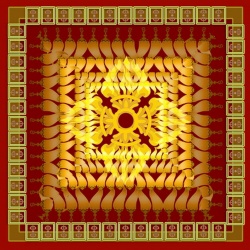Yavakalapi Sutta
Yavakalapi Sutta: The Sheaf of Barley
translated from the Pali by
Thanissaro Bhikkhu
"Suppose, monks, that a sheaf of barley were thrown down at a large four-way intersection, and six men were to come along with flails in their hands. They would thrash the sheaf of barley with their six flails. Thus the sheaf of barley would be thoroughly thrashed with the six flails. Then a seventh man would come along with a flail in his hand. He would thrash the sheaf of barley with a seventh flail. Thus the sheaf of barley would be even more thoroughly thrashed with the seventh flail.
"In the same way, the uninstructed run-of-the-mill person is thrashed in the eye by charming & pleasurable forms... thrashed in the ear by charming & pleasurable sounds... thrashed in the nose by charming & pleasurable aromas... thrashed in the tongue by charming & pleasurable flavors... thrashed in the body by charming & pleasurable tactile sensations... thrashed in the intellect by charming & pleasurable ideas. And if that uninstructed run-of-the-mill person forms intentions for the sake of further becoming in the future, then he that foolish person — is even more thoroughly thrashed, just like the sheaf of barley thrashed with the seventh flail.
"Once, monks, the devas & asuras were arrayed for battle. Then Vepacitti, the lord of the asuras, addressed the asuras: 'If, dear sirs, in the battle of the devas arrayed against the asuras, the asuras win and the devas are defeated, bind Sakka, the lord of the devas, neck, hand, & foot and bring him before me in the city of the asuras.'
"As for Sakka, lord of the devas, he addressed the devas of the Thirty-three: 'If dear sirs, in the battle of the devas arrayed against the asuras, the devas win and the asuras are defeated, bind Vepacitti, the lord of the asuras, neck, hand, & foot and bring him before me in the righteous assembly of the devas.'
"Now, in that battle the devas won. So the devas of the Thirty-three bound Vepacitti, the lord of the asuras, neck, hand, & foot and brought him before Sakka in the righteous assembly of the devas.
"So there was Vepacitti, the lord of the asuras, bound neck, hand, & foot. When the thought occurred to him, 'The devas are in the right and the asuras are in the wrong. I'm now going over to the city of the devas,' then he viewed himself as freed from that fivefold bond. He was fully provided with the fivefold strings of heavenly sensuality. But when the thought occurred to him, 'The asuras are in the right and the devas are in the wrong. I will go over to the city of the asuras,' then he viewed himself as bound with that fivefold bond, deprived of the fivefold strings of heavenly sensuality. That's how subtle the bonds of Vepacitti were. But the bonds of Mara are even more subtle. Anyone who construes is bound by Mara. Anyone who doesn't construe is freed from the Evil One.
"'I am' is a construing. 'I am this' is a construing. 'I shall be' is a construing. 'I shall not be'...'I shall be possessed of form'... 'I shall not be possessed of form'... 'I shall be percipient'... 'I shall not be percipient'... 'I shall be neither percipient nor non-percipient' is a construing. Construing is a disease, construing is a cancer, construing is an arrow. Therefore, monks, you should train yourselves: 'We will dwell with an awareness free of construings.'
"'I am' is a perturbation. 'I am this' is a perturbation. 'I shall be' is a perturbation. 'I shall not be'... 'I shall be possessed of form'... 'I shall not be possessed of form'... 'I shall be percipient'... 'I shall not be percipient'... 'I shall be neither percipient nor non-percipient' is a perturbation. Perturbation is a disease, perturbation is a cancer, perturbation is an arrow. Therefore, monks, you should train yourselves: 'We will dwell with an awareness free of perturbations.'
"'I am' is a wavering. 'I am this' is a wavering. 'I shall be' is a wavering. 'I shall not be'... 'I shall be possessed of form'... 'I shall not be possessed of form'... 'I shall be percipient'... 'I shall not be percipient'... 'I shall be neither percipient nor non-percipient' is a wavering. Wavering is a disease, wavering is a cancer, wavering is an arrow. Therefore, monks, you should train yourselves: 'We will dwell with an awareness free of waverings.'
"'I am' is a objectification. 'I am this' is a objectification. 'I shall be' is a objectification. 'I shall not be'... 'I shall be possessed of form'... 'I shall not be possessed of form'... 'I shall be percipient'... 'I shall not be percipient'... 'I shall be neither percipient nor non-percipient' is a objectification. Objectification is a disease, objectification is a cancer, objectification is an arrow. Therefore, monks, you should train yourselves: 'We will dwell with an awareness free of objectifications.'
"'I am' is an act of conceit. 'I am this' is an act of conceit. 'I shall be' is an act of conceit. 'I shall not be'... 'I shall be possessed of form'... 'I shall not be possessed of form'... 'I shall be percipient'... 'I shall not be percipient'... 'I shall be neither percipient nor non-percipient' is an act of conceit. An act of conceit is a disease, an act of conceit is a cancer, an act of conceit is an arrow. Therefore, monks, you should train yourselves: 'We will dwell with an awareness free of acts of conceit.'"
